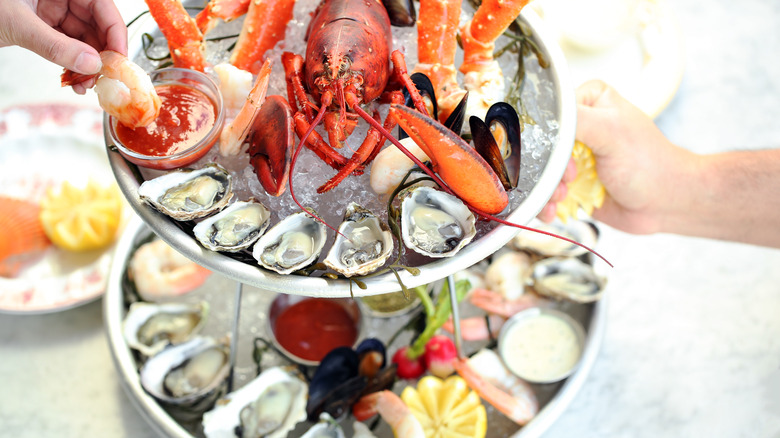Always Ask This Before Ordering Raw Seafood, According To The FDA
The ocean offers up a bounty of delicious culinary fare, but if you're going to order raw seafood from a restaurant, it's best to exercise some caution and heed the guidance of food safety experts. After all, eating raw items such as oysters, sushi, or sashimi can increase the risk of food-borne illnesses, so an ounce of prevention is worth a pound of tummy cure. The FDA offers a number of tips and recommendations on ordering raw foods, including researching the restaurant where you plan to eat. You can also look up health and safety inspections online or on local or state regulatory websites, to view things like sanitation grades.
Temperature is another key factor involved in ordering raw seafood. You'll want to ask whether your seafood was frozen, thawed, or kept on ice. Seafood towers stacked high with piles of shellfish and crustaceans and served on ice are not only aesthetic crowd pleasers, but you also know its contents have been kept cold. Any raw seafood that has been left out and becomes warm is unsafe to eat. It is also a good idea to be wary of eating raw fish on Sundays, since fish markets are often closed that day and it is best to order sushi when it is at its peak freshness and has just come into the restaurant.
How to properly store raw food leftovers
Depending on the restaurant's portion sizes and the extent of your appetite, you might have some raw seafood leftovers to tote home. Just make sure that you get them refrigerated within two hours and eat them within 24 hours of stashing them in the fridge or else they will spoil (via FDA). When it comes to gauging whether leftover raw seafood is safe to eat, give it a quick sniff test. If something smells fishy and emits an unpleasant odor, you can confidently toss it in the trash. There are also certain groups of people for whom the FDA suggests avoiding ordering raw seafood altogether, particularly raw fish and oysters.
These include women who are pregnant or nursing, people who are immunocompromised, and individuals with underlying health conditions like cancer or diabetes. Although you need to be careful about ordering raw seafood, fish and shellfish are an important part of a healthy, balanced diet and contain essential nutrients, per the FDA. The American Heart Association recommends eating fish twice a week to reduce the risk of cardiovascular diseases. While helpful to know whether raw seafood has been properly handled, there is no reason to eschew raw seafood completely as long as it has been safely stored and prepared.

